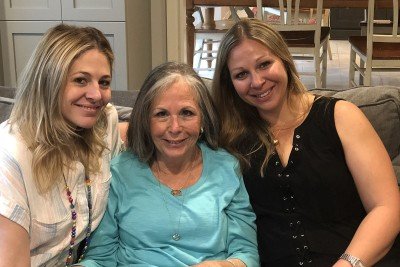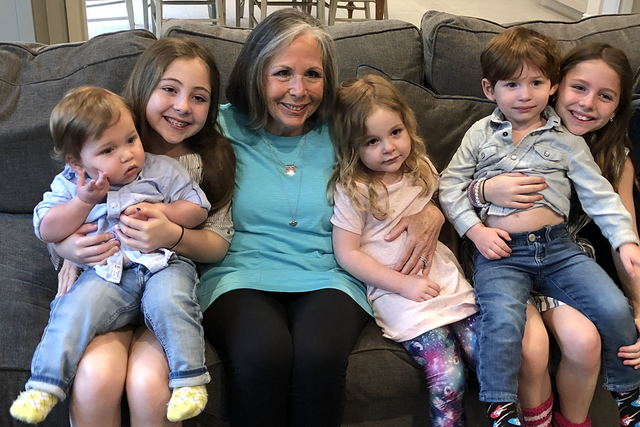Twist of Fate: How a Change in Diagnosis Saved Lynne's Life
Lynne Pilger was diagnosed in 2016 with a rare soft tissue sarcoma. She initially received care at another hospital near her New Jersey home. When the treatment didn’t work she turned to Memorial Sloan Kettering, where doctors made a lifesaving change in her diagnosis.

Lynne celebrates Mother’s Day 2019 with her daughters.
In May 2016, New Jersey resident Lynne Pilger, then 63, was enjoying a weekend with her grandchildren when she experienced a strange sensation in her back. “I picked up my granddaughter, and it felt like something had collapsed,” she recalls. By the time she dropped her grandchildren off at her daughter’s house a few days later, she was in so much pain she could hardly speak.
Concerned, Lynne’s husband Bruce drove her to the emergency room, where she had imaging done on her back. The ER doctors told her she might have a kidney stone. But the results of Lynne’s scans showed something very different: a destructive mass in her vertebrae. Eventually, Lynne was diagnosed with a malignant peripheral nerve sheath tumor, a rare and aggressive type of soft tissue sarcoma.
Not wanting to travel far for her care, Lynne underwent a series of procedures at a hospital near her home to stabilize her back and remove the tumor. But after six months, Lynne’s condition worsened, and her doctors told her the situation was “dire.” Fearing for her life, she and her husband Bruce turned to Memorial Sloan Kettering. “The possibility of losing my life was staring me in the face,” Lynne says of her decision, “and I knew MSK was the best place for me to go.”
Coming to MSK
Lynne and Bruce traveled to Manhattan to meet with medical oncologist and sarcoma specialist Bill Tap. Dr. Tap explained that treatment options for malignant peripheral nerve sheath tumors were limited, but first he wanted to recheck the stage of Lynne’s tumor. The results showed that the cancer was now in Lynne’s spine, rib, liver, and lungs.
While the news was bad, it also gave Dr. Tap and the team one of several important clues: Malignant peripheral nerve sheath tumors generally do not spread to the liver. Could Lynne have been diagnosed incorrectly?
Lynne had a biopsy early on in her care, but it hadn’t contained much tissue. Dr. Tap believed a second biopsy could help answer the question of what to do next. “In the original biopsy, there was some suggestion that Lynne could have a sarcoma,” Dr. Tap recalls. “However, there are 50 to 80 different subtypes of sarcoma, and it’s fairly common for us to change a sarcoma diagnosis from one subtype to another.”
Lynne had a second biopsy later that month. Pathologist Cristina Antonescu, a leading expert in sarcoma diagnosis, studied the tissue under a microscope. In addition, MSK experts analyzed Lynne’s tumor sample using a highly sophisticated genomic sequencing technology called MSK-IMPACT. The test looks for mutations in more than 400 genes in patients’ tumor samples and can sometimes help doctors create a personalized treatment plan based on those mutations.
Shortly after, Dr. Antonescu told Lynne’s care team that the tumor was more consistent with a melanoma. A few days later, the results of the MSK-IMPACT test came back showing a high rate of genetic mutations related to ultraviolet (UV) sunlight. Exposure to UV light is a major risk factor for melanoma, but not for sarcoma.
Armed with this new information, Dr. Tap immediately referred Lynne to colleague Alexander Shoushtari, who specializes in caring for people with advanced melanoma. Dr. Shoushtari agreed to see Lynne the next morning.
Silver Linings
Dr. Shoushtari told Lynne she had stage IV melanoma. It was aggressive and wouldn’t respond to chemotherapy, but there was a silver lining. Her change in diagnosis made her a candidate for immunotherapy with checkpoint inhibitors, a lifesaving cancer treatment pioneered at MSK.
“It was a very emotional visit,” recalls Dr. Shoushtari. “She’s a very warm person, but when I met her I could see that she was in pain. Her whole demeanor changed when I told her she had a realistic chance to live for many years.”
Dr. Shoushtari started Lynne on two immunotherapy drugs, nivolumab (Opdivo®) and ipilimumab (Yervoy®). MSK had led the clinical testing of this powerful combination, and in 2015 the US Food and Drug Administration approved its use in people with advanced melanoma. Between February and March 2017, Lynne received four infusions.
The therapy was not without its complications. Lynne experienced problems with her thyroid as well as her liver. Nevertheless, the cancer responded to the treatment, and Lynne was, in her words, “absolutely joyous.”

Lynne enjoys spending time with her five grandchildren.
Life after Immunotherapy
Two years after immunotherapy, Lynne has not needed further cancer treatment. Imaging tests show that her immune system has nearly eliminated all visible traces of melanoma, although she needs lifelong follow-up care to monitor for a recurrence. Her posture was affected by the surgeries she had early in her treatment. She also takes medicine to manage the thyroid condition caused by the immunotherapy. She’s experienced some changes in her vision and hearing as well.
Nonetheless, “I am so grateful to everyone at MSK,” Lynne says. “I didn’t think I was going to live. They took me from that to having no active cancer in my body.”
Of Lynne’s case, Dr. Shoushtari reflects, “At every step of her treatment, we were able to provide Lynne with care I don’t think she could’ve gotten anywhere else, whether it was the MSK-IMPACT testing or our unparalleled experience with nivolumab plus ipilimumab. But it really began with Dr. Antonescu and Dr. Tap, who know so much about sarcoma that they questioned her diagnosis.”
As for her life beyond cancer, Lynne and Bruce have welcomed two new grandsons into the world since she completed care. This summer, they look forward to ticking off an item on Lynne’s bucket list when they go on a cruise to Alaska.



